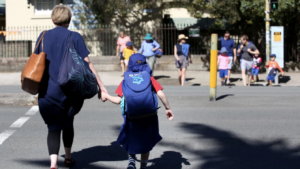Home » Commentary » Opinion » School closures: Student learning has been damaged
· Daily Telegraph
 School closures have wiped valuable weeks from students’ learning, and disadvantaged students will be hardest hit.
School closures have wiped valuable weeks from students’ learning, and disadvantaged students will be hardest hit.
This has happened because some state and territory governments — Victoria, Tasmania, the ACT, New South Wales and Queensland — ignored the consistent expert medical advice to the National Cabinet that it was safe for schools to remain open and decided instead to close schools for most students for almost a whole term.
Many children from disadvantaged backgrounds have been set even further back as a result. They tend to have less access to effective parental support, educational resources, and fast internet at home, so they were always going to be hurt disproportionately by government school closures.
According to our research, the educational cost of school closures to disadvantaged students amounts to between two and three weeks of lost learning in numeracy, and between one and two weeks of lost learning in reading.
This will exacerbate existing inequities, with students from disadvantaged social backgrounds already being behind by approximately 37 weeks in numeracy and 35 weeks in reading compared to the typical Australian student by the age of 15.
It’s true that parents were told students would not be turned away from school and children of essential workers could attend — albeit with mixed messages about safety. But this is still ultimately closing schools, because the small minority of children who still attend school learn in basically the same way as students learning from home, without normal face-to-face classes.
Most parents kept their children home — amid the naive, unreasonable government expectation that parents could simultaneously work from home and supervise their children’s education — with serious economic consequences. Estimates from the Australian Treasury indicate the lower economic activity due to school closures could cost 300,000 jobs for the first six months of 2020. Every lost job involves a real human and social cost, not just economic.
But is there evidence of a public health benefit, at least? A study of NSW schools by the National Centre for Immunisation Research and Surveillance found the COVID-19 transmission rate in schools was “extraordinarily low” and there were no cases of students infecting staff. So it appears there was little or no public health benefit of closing schools — all pain and no gain.
Objectively bad outcomes like this are sometimes an inevitable result of our federalist system. The Morrison government couldn’t force states and territories to keep government schools open.
The South Australia, Western Australia, and Northern Territory governments should be commended for following the Commonwealth’s lead and only closing schools for one or two weeks, meaning their disadvantaged students would be just minimally affected.
But the other five governments should reflect on the unnecessary educational damage inflicted. They made a decision based on politics — influenced by teacher unions — not evidence.
Sure, in a time when emotions are running high, it is difficult for politicians to follow the evidence where it leads. But evidence-based public policy is more important, not less, during a pandemic.
The educational loss is significant, but not catastrophic or irretrievable. However, it requires a clear plan from government school systems to ensure students who have fallen behind can catch up to their peers as soon as possible.
It’s vital that schools assess student progress as they return to face-to-face classes, identify students who have fallen behind, and intervene to help them. Literacy and numeracy assessments of this kind are especially important since NAPLAN has been cancelled for 2020.
There have been predictable calls for more money to help schools (as though the massive Gonski funding increases over recent years were a mere figment of budgetary imagination). But in reality, existing resources can be better targeted towards core literacy and numeracy skills for disadvantaged students who have fallen behind. Spending money more efficiently would mean more taxpayer funding isn’t necessary.
State and territory education ministers love to often remind us that they really care about disadvantaged students and that they — not the Commonwealth — run their own school systems. It’s time to hold them to account.
School closures: Student learning has been damaged